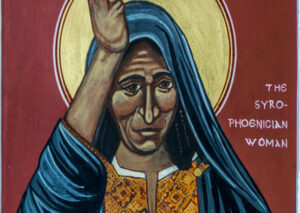 Early in his ministry, Jesus sent the Apostles out two-by-two with instructions to “Go nowhere among the Gentiles, and enter no town of the Samaritans, but go rather to the lost sheep of the House of Israel.” They were instructed to preach repentance saying “The Kingdom of Heaven is at hand; heal the sick, raise the dead, cleanse lepers, and cast out demons…” [Mt.10] Tall orders indeed. But precise in one respect. Don’t do any of this among foreigners.
Early in his ministry, Jesus sent the Apostles out two-by-two with instructions to “Go nowhere among the Gentiles, and enter no town of the Samaritans, but go rather to the lost sheep of the House of Israel.” They were instructed to preach repentance saying “The Kingdom of Heaven is at hand; heal the sick, raise the dead, cleanse lepers, and cast out demons…” [Mt.10] Tall orders indeed. But precise in one respect. Don’t do any of this among foreigners.
Following reports of this effort, Jesus upbraids the Jewish towns because they did not repent. He says “If such things had been done in Tyre and Sidon (Canaanite country – now modern Lebanon) they would have repented in sackcloth and ashes!”[Mt. 11:21]
Sometime later as they were journeying near a wheat field, the disciples of Jesus plucked some heads of grain to eat and some Pharisees criticized them for working on the Sabbath. Jesus then healed a man’s hand and the Pharisees criticized him for healing on the Sabbath. After this, the Pharisees felt they had what they needed and “took counsel among themselves and sought a way to destroy him.”[Mt 12:14]
It’s quite clear after repeated confrontations of this same type, that the Pharisees aren’t really interested in engaging Jesus about the meaning of his teaching and behaviors. They conduct all discussions with the presumption that they are already in possession of the correct view and without need to discover his understanding. They have no interest or willingness to risk an encounter of vulnerability to the truth of Christ, but only to judge and shame him in public out of a prejudice of their righteousness. For them it is always a monologue conducted out of zealously protected superiority in the service of Tradition. For Jesus it is always about a Communion of Love offered in and through His own life laid down for others. His judges and attackers are the guardians of the Tradition of the Elders and in their eyes, Jesus and his disciples are upstarts in violation of it. Therefore no discussion is needed.
When Jesus heard that King Herod had executed John the Baptist [Mt 14:13], whom Jesus had declared the greatest prophet in Israel’s history, he withdrew by himself to a solitary place to pray. Things weren’t looking so good in Israel as far as obedience to God leading to welcoming of their long-awaited Messiah.
After Jesus returned from seclusion and prayer, he and his disciples went up to Gennesaret on the northwestern shore of the Sea of Galilee across from Capernaum. Pharisees and Scribes came all the way from Jerusalem (That’s a 60-80-mile walk!) in order to ask Jesus another version of the same burning question that they kept repeating wherever they encountered him, “Why do your disciples transgress the tradition of the elders?” In this case, they objected that his disciples did not wash their hands before they ate?
Jesus responded by asking the Pharisees a question in return. “Why do you elders use your Tradition to transgress the commandments of God? For God commanded, ‘Honor your father and mother and He who speaks evil of father or mother, let him surely die.’ But you say, ‘If anyone tells his father or mother, ‘What you would have gained from me is set apart for God,’ he need not honor his father and mother. So, for the sake of your tradition you have made void the word of God. You hypocrites! Well did Isaiah the prophesy of you when he said “This people honors me with their lips, but their heart is far from me; in vain do they worship me, teaching as doctrines the precepts of men.” [Mt 15:9]
Jesus calls his disciples to him and elaborates further that it is not what goes into the stomach that defiles a person, but the evil things come out of the heart and are expressed by what people do—like this Corban rule that makes it impossible to share your assets with your aging parents in need because it is set apart for God. Jesus says, this kind of inhumanity to man is what defiles a person, not eating with unwashed hands.
At this point, his disciples’ own conflicts over tradition and the power and prestige of the Pharisees is revealed. They say to Jesus “Are you aware that the Pharisees were offended when they heard you say this?”[Mt 15:12] Really? Maybe they wanted to protect Jesus and help him stay out of trouble with the authorities. But Jesus is deliberately moving toward the conflict that will lead to his martyrdom precisely because he honors Truth rather than the traditions of men by whom Tradition is taken over and misappropriated. Jesus is the Truth of the Law which is love and mercy. He is not obedient to rules and authority used in ways that prevent love and mercy. Jesus honors God rather than men, as all the martyrs of the Church’s history have done and continue to do in order to save Tradition from sin that obscures the reality of Christ in our midst who is its fulfillment.
When Tradition is reduced to a religious ideology used to preserve worldly power and serve worldly ends in the name of God, it fails to serve the purpose for which it was intended, which is to offer us an accurate framework for worship and a living Communion of love with God, one another and all Creation.
Jesus responds to his disciples’ anxiety by saying simply “Leave them alone. They are blind guides and if a blind man leads a blind man, both will fall into a ditch.”But Peter is still not satisfied and asks him, “Explain this parable to us.”[Mt 15:15]
Jesus says “Peter you still don’t understand?” So he becomes blunt and graphic. “Everything that enters the mouth goes into the stomach and then is expelled into the sewer, but what comes out of the heart goes forth and defiles the person. For out of the heart comes forth evil thoughts, fornication, murders, adulteries, theft, lying, blasphemies. These are what defile a person, but to eat with unwashed hands does not defile a man.”[Mt 15:16-20]
This conflict between the wrong use of Tradition to secretly attain status and power, hide our sins and impede doing good and showing mercy to others, goes to the heart of the Gospel. It is the struggle of Man’s will vs GOD’s will;’ of egotism versus the Communion of love that characterizes the Church.
Once again we are reminded that Jesus is indicted and executed for violating the “Tradition of the elders” by living a life of love and mercy as being the essence of the Tradition. Failure to recognize this as the primary sign of God’s presence among us, is a continuing danger for us in the Church and the history of Orthodox Tradition bears this out. It cannot be otherwise because this struggle to affirm “behold through the Cross and Resurrection, joy has come to all the world” goes on in each human heart. Could the Gospel be true? Can God love this much?
The Pharisees wouldn’t have bothered making the 60-mile trip from Jerusalem if Jesus had not gained a considerable following that was proving a disturbance to them. This is the point in the Gospel narrative at which Jesus takes his disciples out of Israel into the country of Tyre and Sidon; the land of the ancient Canaanites who had been enemies of the Jews for a thousand years. Joshua had conquered Jericho, a Canaanite city.
Tyre at that time was a thriving seaport on the Mediterranean Sea, part of the ancient Phoenician lands. Tyre and Sidon occupied what is part of modern Lebanon now, a land that included the Canaanites who were ancient enemies of Israel, who worshipped their god Baal.
In 33 AD there is a magnificent gleaming marble Temple dominating the landscape of Jerusalem, served by thousands of priests, Levites and Pharisees as well as a booming business of exchanging silver from Tyre for the lesser valued metals of the Israeli coins for use in making all donations in Temple Treasury. Pilgrims swell the population by 150,000 or more on feast days. While the Canaanites themselves were considered unclean and not part of Jewish Tradition, their silver was welcomed and considered more valuable than Jewish coins. That’s why there were money changers in the Temple.
The scene has now been set for the encounter of the Jewish Messiah and the foreigner with a demon-possessed child as the disciples look on.
Leaving that place, Jesus withdrew to the region of Tyre and Sidon. A Canaanite woman from that vicinity came to him, crying out, “Lord, Son of David, have mercy on me! My daughter is suffering terribly from demon-possession.” Jesus did not answer a word. So, his disciples came to him and urged him, “Send her away, for she keeps crying out after us.” He answered, “I was sent only to the lost sheep of Israel.” The woman came and knelt before him. “Lord, help me!” she said. He replied, “It is not right to take the children’s bread and toss it to their dogs.” “Yes, Lord,” she said, “but even the dogs eat the crumbs that fall from their masters’ table.” Then Jesus answered, “Woman, you have great faith! Your request is granted.” And her daughter was healed from that very hour. Mt: 15:21-28
Jesus left that place and went to the vicinity of Tyre. He entered a house and did not want anyone to know it; yet he could not keep his presence secret. In fact, as soon as she heard about him, a woman whose little daughter was possessed by an evil spirit came and fell at his feet. The woman was a Greek, born in Syrian Phoenicia. She begged Jesus to drive the demon out of her daughter. “First let the children eat all they want,” he told her, “for it is not right to take the children’s bread and toss it to their dogs.” “Yes, Lord,” she replied, “but even the dogs under the table eat the children’s crumbs.” Then he told her, “For such a reply, you may go; the demon has left your daughter.” Mark 7:24-29
Humility, contrition, and love made this foreigner an example of faith for all Israel and for the Apostles who remembered and retold this encounter among the few they recorded to tell the story of Jesus. It is certainly not a flattering remembrance for the Apostles. Couldn’t they have found some encounters that showed them in a better light? They confessed that in those early days of following Jesus, they were still seeking worldly glory instead of the humility of the cross Jesus tried to teach them about. In one instance their response had been to express the naïvely ambitious request to sit in glory beside him in the Kingdom. “Teacher we want you to do whatever we ask…” [Mk 10:35] In Mathew’s account, it’s their mother that asks! [Mt 20:20]. On another occasion after Jesus had tried to reveal to them the way of the Cross, they confessed to arguing with one another while walking along the road, which of them was the greatest. [Mk 9:34]
What we should realize, by the inclusion of this account along with the other examples of the Apostles’ confessions of their own vulnerability to the same temptations as the Pharisees, is that they had become more aware of their weakness shared with the whole human race. Humility had come upon them as a gift of the Holy Spirit and a mercy that now extended to all the world. St. Isaac the Syrian says that Christ is clothed in humility, wearing humility as a garment. Jesus said “Come to me all of you who are weary and heavy laden and I will give you rest for your souls, because my yoke is easy and my burden is light.” [Mt 11:30]
What are we to understand from the encounter with Jesus and his disciples and the Syro-Phoenician? Jesus appears to use what would be considered a racial slur. As a foreigner and non-Jew, the woman is racially unclean. “Dog” is the common way the Jews referred to gentile people. To then diminutize this as “little dog,” or perhaps “puppy” is even more intense. Anyone from our postmodern culture marinating in ideological fervor and attention to micro-aggressions would be hot and totally bothered. But the Canaanite woman’s response is far more nuanced and complex. It is from an entirely different register that has nothing whatsoever to do with her own ego or preserving her own subjective psychological equilibrium. Her life is given for her daughter’s sake and the Spirit is at work in her.
St. Gregory Palamas says that when the she heard Jesus calling her “the lowest of dogs (literally “little dog”) in front of his disciples, she replied with emphatic self-condemnation and humility, Truth, Lord (Mt. 15:27)”[1]
Why would Jesus do such a thing? Why does he initially keep silent when she implores him with pain of heart in behalf of her daughter? Surely just as he had seen Nathaniel under the fig tree [Jn 1:50] he could see this woman’s soul quite clearly and knew her heart before she ever spoke a word. He also recognized that her humility and faith were of such a degree, and her fervent love for her daughter, that her response to his denial would be a shocking revelation to his Apostles, a living parable they would never forget and never let the collective memory of the Church forget.
At the time this drama unfolded, we might imagine that the disciples were having trouble seeing past her ethnicity and what we Orthodox might call today, her ‘heterodox’ faith in comparison to an imagined superiority as a result of being the Lord’s true Church. To be fair, perhaps the disciples were trying to be obedient to Jesus’ earlier instructions that they should go out and heal the sick and cast out demons, but only among Israel, and not outside its borders. Either way, they are in danger of being no different than the Temple Authorities who had previously accused Jesus of betraying Tradition. The disciples complained to the Lord, “Send her away because she is whining after us.”[2]
She was pleading, out of love, for the healing of her daughter while the disciples, so sure of their own correctness and the correctness of their Teacher, were hard-hearted to the human reality in front of them in the same way Jesus had pointed out the Pharisees were unfeeling toward the human need of their parents and the man healed on the Sabbath. Did God call the Jewish nation his chosen people and set them apart as a holy nation as the Pharisees had set apart their own resources as “Corban” so that their zeal and dedication to God results in not benefitting the rest humanity in need? Jesus was merciful and the Pharisees condemned him for it. Jesus loved and the Pharisees hated him for it. Curiously he now appears to deny mercy and reject the foreigner and she responds without the slightest hint of rancor or indignance.
It may be that at this moment Jesus was intentionally giving his disciples a shocking wake-up call to the need for a deeper repentance and the recognition that the heart of the Law is mercy, not judgment. They are now before the question, “Are you also just like the Pharisees without realizing it? Do you agree that we should respond to this unflinching mother whose heart is aching for her daughter, who acknowledges me as Son of David, the King, and calls me Lord, as though she were nothing but a little dog, a foreigner outside Israel without faith and undeserving of God’s mercy? Tell me, are you scandalized by her? Are you still blind followers of those blind Pharisees and Scribes who use Tradition in this way? Are you going to turn your relationship with me into the same thing and use it in the same way?
Egotism, ideological zeal and nationalistic pride reduce the Living Christ to an ideology dedicated to protecting worldly power and control of the few who believe in their own righteousness instead of approaching the holiness of God with “fear, faith and love” and struggling to lay down our lives for one another in forgiveness and communion.
St. Gregory Palamas writes that the Syro-Phoenician woman at that moment, knew the deeper truth that was evading Jesus’s own disciples. While they were blinded by their allegiance to the Tradition of men, she was guided by unswerving love for her daughter. While they feared the disapproval of the Pharisees, she did not react to an obvious racial slur, but love and humility made for the meekness to continue her entreaty. Evagrius Ponticus observes, “the meek person does not refrain from love, even if he must suffer the worst.”[3] St Maximus the Confessor describes meekness as “courage plus immovability of desire and will.” This mother certainly had this for her daughter. And like blind Bartimaeus, she too prayed the Jesus prayer, ‘Lord Jesus, son of David, have mercy on me!”
Elder Haralambos Dionysiatis, one of the five disciples of St. Joseph the Hesychast and teacher of Noetic prayer, recognized the depth of the Syro-Phoenician woman’s entreaty as being an example of noetic prayer. He writes that
when she was pleading with Christ over her child, she was saying out loud, “Lord have mercy on me,” with all her soul. That is prayer of the heart. My child, when the mind is absorbed in God, even if you pray aloud, the prayer is called prayer of the heart. It comes from the depths of the heart. Heart and mind are united with God.[4]
Her humility, faith and love expressed in her boldness without rancor or pride, testified that she lived more truly the Tradition than did the Scribes and Pharisees and at that moment, Jesus’s own disciples. Perhaps they were so confident in their teacher and their appropriation of Tradition that they felt superior to this foreigner. They were annoyed by her pleading for help for her daughter because she didn’t have the right accent; she didn’t live within the borders of their country.. She hadn’t yet confirmed officially her conversion. Why should she share in what Jesus was doing for those in Israel who were already demonstrably part of their Tradition?
If the disciples had been of the same spiritual maturity as this woman, if they had known the same pain of heart born of love for someone in need, perhaps they would have been surprised and confused by their Teacher’s silence in the face of this mother’s entreaty. Perhaps they would have been pained by the racial slur and justification Jesus used as a reason not to help her; a reason she waved away with a gentle alternative of inclusion.
Faith, hope and love for Christ and one another, along with life-long repentance and the meekness that gives boldness to persist in the face of all temptations and persecution are the path to fulfillment and preservation of Holy Orthodox Tradition which is always characterized by a mercy that spills over beyond what we think is correct; and an encounter of love and meekness in Eucharistic Communion with the Lord Jesus Christ, the Son of the Living God, that takes us farther than we can go by human willpower, strength and cleverness alone.
______________________________________
[1]Veniamin, Christopher (trans.) Saint Gregory Palamas the Homilies. Pennsylvania: Mount Thabor
[2] The Greek word Απολύσαν (from απολύω) according to Kittel, can mean “release, liberate, forgive” or “dismiss, send away, be rid of.” Patristic interpretations vary in viewing the disciples as offering intercession to the Lord to hear her prayer and as being annoyed by her shouting and crying after them. The import of the narrative, in either case, is to emphasize the Apostolic testimony and later understanding that Christ’s ministry of love and mercy is offered beyond the national confines of Israel and that the Tradition, fulfilled in Christ Himself, is open to all.
[3] Evagrius Ponticus, cited in Bunge, G. Dragon’s Wine and Angel’s Bread. Crestwood, NY: St. Vladimir’s Seminary Press. 2009, p. 82.
[4] Monk Joseph. Abbot Haralambos Dionysiatis, The Teacher of Noetic Prayer, Athens, Greece: H. Monastery of Dionysiou, p. 214.



